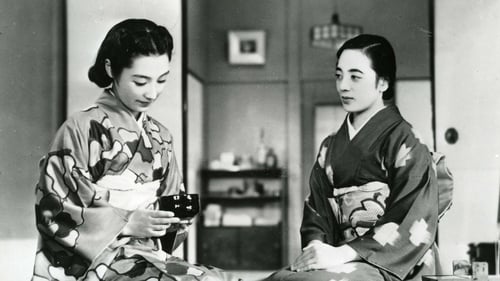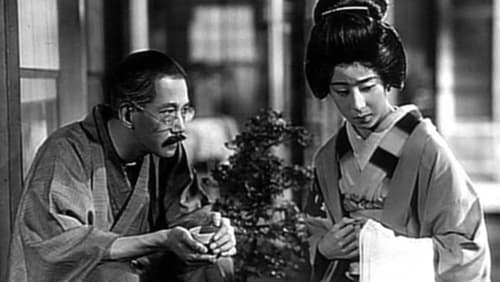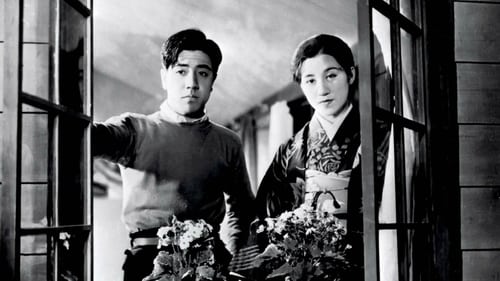Setsuko Shinobu
출생 : 1914-07-22, Tokyo, Japan

Tsuneko

Pretty Oshige is deceived by her first love. After this, she lives a hard lifestyle, working at a number of jobs. Her only pleasure is her nephew, who eventually becomes a merchant marine. When Oshige meets her old love ten years later, she is able to forgive him and even thank him for the path her life has taken.

Inoue was something of a rarity in the sense, that he was a Shochiku house director who seems to have worked mostly in period films, often with big stars like Hasegawa or Bando. "Sumidagawa", named after the river that runs through Tokyo, is also a period film, but thematically a modern one. All the themes that you associate with the normal Shochiku women's films set in the present day are in this film, just in a different context: love, the planning of a marriage, career, family relations and societal melancholy. There is no action or swordplay.

한 가족의 몰락과 재건에 관한 이야기를 담고 있는 이 작품은 당시 흥행과 작품성에서 모두 성공한 초기작으로 장면간의 전환 또는 휴지부로 기능하는 여백 쇼트의 사용, 움직임이 없는 정적인 카메라 등 가장 오즈적이라고 특징지을 수 있는 후기 작품들의 양식과 내러티브 형태가 특징적으로 드러나는 작품이다. 경제계의 거물이었던 도다씨의 갑작스러운 죽음 이후 둘째 아들 쇼지로는 중국 천진으로 돈을 벌기 위해 떠나고 남은 도다 부인과 막내 딸 세츠코는 귀찮은 존재로 외면당한 채 형제들 집을 전전하다 결국 처분조차 힘든 바닷가의 낡은 집으로 옮겨간다. 도다씨의 기일을 지내기 위해 천진에서 돌아온 쇼지로는 어머니와 여동생에 대한 형제들의 태도에 대해 분통을 터트린다.

Kikuta
Movie about a devoted and single woman and her daughter. The mother's nickname is "Bokuseki" (wooden head) because of his supposed stubbornness. No.10 in the list of "The 10 best films of 1940" by Kinema Junpo.

Tezuka
A spirited young teacher challenges the conservative school employing her with liberal thinking and teaching methods.

Adaptation of Kishida Kunio's novel. Set against the backdrop of a power struggle within a hospital, depicts the love lives of the director's daughter, the administrative director, a doctor, and a nurse.

Weed with Flowers

A young doctor, Kozo Tsumura, falls for young nurse Katsue Takaishi. But she's got a secret: she's a widow with a son. Kozo and Katsue decide to run away to Kyoto, but her child suddenly became sick and she just missed the train and Kozo. She makes it to Kyoto finally, but is unable to meet him. Plus she isn't accepted into Kyoto society. She goes back to her hometown and tries to forget him. She quits the hospital to concentrate on her singing. She makes her professional debut with the hit "Aizen Katsura". Kozo is in the audience.

A 1937 Japanese film.

A-ko
Yuki is a young, single mother supporting herself and her son, Haru, with a job as a bar hostess.

Woman at the apartment
Three men fall in love with the same young girl who works in a tonkatsu restaurant in the Shitamachi district of Tokyo.

The eldest daughter of a noble family is in love with an aviator while being courted by a fellow aristocrat she thinks is a dullard. This part is told from the perspective of Akemi.

Returning villager's daughter
아리가토 씨는 젊고 친절한 버스 운전사로, 그가 모는 버스는 가난한 해안가 마을에서 산을 넘어 도시로 향한다. 그는 좁은 길에서 길을 비켜주는 주민들에게 언제나 ‘고맙습니다’라는 인사를 전한다. 딸을 대처로 보내려는 걱정 많은 어머니와 그 딸, 아리가토 씨에게 추파를 던지는 여인 등 오늘도 다양한 승객들이 아리가토 씨의 버스에 오른다.

Family drama. A middle-aged father has just married off his third daughter, but still has his nine year old son to raise whom he resents as he was unwanted. (British Film Institute)

His wife
This pair of gentle yet witty and inventive comedies from the director of The Neighbour's Wife and Mine typify both the formal experimentation of early Japanese sound cinema and the social milieux that Shochiku tended to depict. 'Virtually plotless, and feeling more like comic sketches than fully developed stories,' writes Arthur Nolletti, Jr, 'these light comedies, or farces, take a wholly trivial matter (often a socially embarrassing situation) and use it as a springboard for a succession of gags.' Much of the films' distinction comes from the wit of Gosho's direction, the imaginative use of the new sound technology and the charm of the acting, particularly of the heroines (Kinuyo Tanaka in Bride; Hiroko Kawasaki in Groom). Yet in both films, Gosho finds room for some shrewd observation of character and environment, subtly exploring the values and assumptions of the suburban petit bourgeoisie.

Waitress
The story is centered around the devastating experiences of two villagers, Osaki Shuichi, and his cousin, Nishimiura Kinue, when they leave their hometown for the metropolis of Tokyo. They are in love with each other, but Kinue is expected to marry the lawyer Kanda Seiji. In consequence, Shukichi leaves for Tokyo, where he becomes tutor to the son of the rick Iwaki family. The heartbroken Kinue also makes her way to the capital, where she becomes a bar hostess.

Sugiko Shima
Mikio Naruse’s final silent film is a gloriously rich portrait of a waitress, Sugiko, whose life, despite a host of male admirers and even some intrigued movie talent scouts, ends up taking a suffocatingly domestic turn after a wealthy businessman accidentally hits her with his car.













